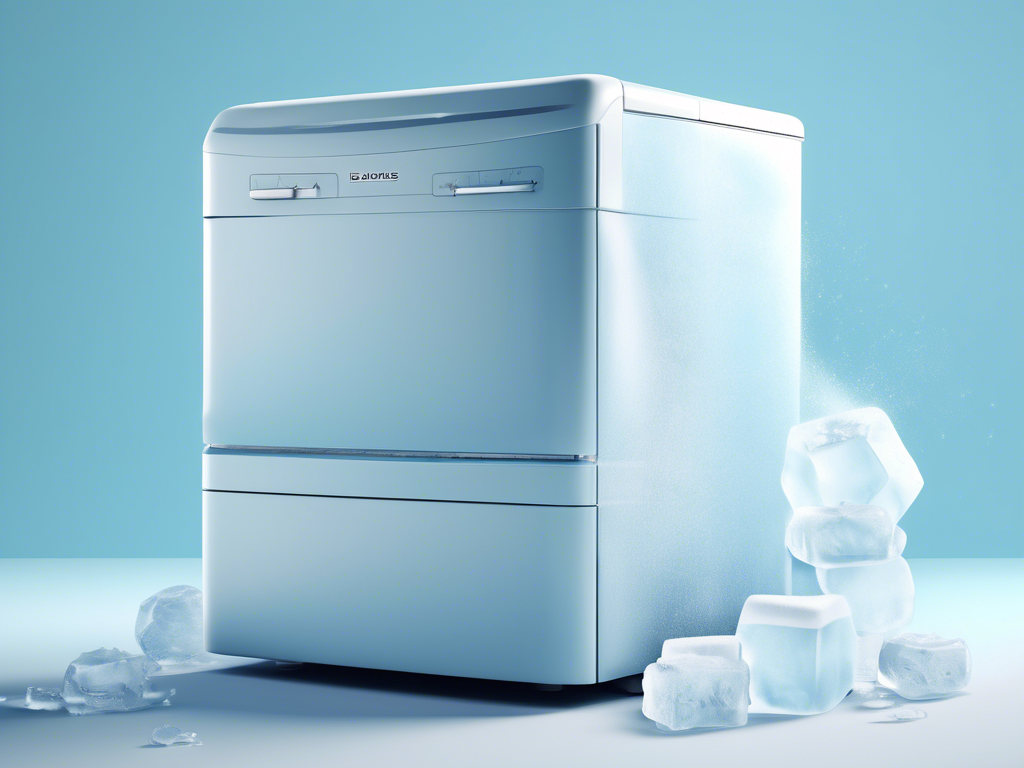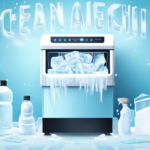When was the last time you thought about the cleanliness of your ice maker? Surprisingly, many homeowners overlook this essential appliance that plays a crucial role in our daily lives—from serving chilled beverages to making delicious frozen treats. Just like other kitchen gadgets, your ice maker requires regular care to ensure peak performance and hygiene. Regular maintenance is the secret ingredient to a long-lasting, efficient ice maker that consistently delivers fresh, clean ice.
In this comprehensive guide, we’ll explore everything you need to know about keeping your ice maker in top condition. We’ll provide you with the essential tools required for cleaning, step-by-step instructions for a deep clean, and the importance of maintaining a cleaner certificate for your appliances. With these insights, you’ll not only enhance the lifespan of your ice maker but also improve the quality of ice it produces.
As we navigate through common cleaning mistakes to avoid and eco-friendly solutions to try, you will discover how often you should schedule cleanings to keep your appliance in check. Plus, we’ll discuss the benefits of having a cleaner certificate for your home appliances, underscoring the significance of ensuring all your kitchen gadgets are as hygienic as possible. Get ready to transform your ice-making experience!
Why Regular Maintenance is Key to a Long-Lasting Ice Maker

Preventing Contaminants and Build-up
Regular maintenance of your ice maker is essential to prevent the accumulation of contaminants and mineral build-up. Over time, minerals from water can create scale that not only affects the taste of your ice but also clogs the machine. Cleaning your ice maker regularly ensures it operates efficiently, yielding pure and tasty ice every time. A cleaner machine means a healthier output, free from any unwanted particles or odors. 🌊
Extending the Lifespan of Your Appliance
Just like any other appliance, an ice maker benefits significantly from routine cleaning and upkeep. Regular maintenance helps you avoid costly repairs or premature replacement. By keeping the components clean and functioning properly, you can increase the lifespan of your ice maker. Investing the time in maintenance pays off in the long run, allowing you to enjoy ice-cold beverages without interruption for years to come. ⏳
Energy Efficiency Boost
A well-maintained ice maker operates more efficiently, which translates into lower energy consumption. When dirt and grime accumulate, the machine has to work harder to produce ice, leading to increased electricity bills. Incorporating regular cleaning activities, such as descaling and sanitizing, can significantly improve your machine’s energy efficiency. This not only saves you money but also reduces your carbon footprint! 💡
Ensuring Compliance with Cleaner Certificate Regulations
If you operate an ice maker in a commercial setting, adhering to health and safety regulations is crucial. Obtaining a cleaner certificate often requires maintaining a high standard of cleanliness and sanitation. Routine maintenance checks and deep cleans are vital to meeting these standards. Being compliant not only protects your customers’ health but also safeguards your business reputation. 🏅
Improving the Quality of Ice Production
The quality of the ice produced by your machine can vary significantly based on how regularly it is cleaned. A neglected ice maker may produce cloudy, smelly, or poorly formed ice cubes. By focusing on regular maintenance, you ensure that the ice is crystal clear and devoid of any unpleasant flavors. This is particularly important for bars and restaurants that pride themselves on serving refreshing beverages with perfect ice. 🍹
Reducing Repair Costs
Investing in regular maintenance can significantly reduce the risk of unexpected breakdowns and expensive repairs. Identifying small issues before they escalate into larger problems can save you both time and money. By scheduling routine cleanings and inspections, you can address minor issues early on and avoid emergency repair costs later. Remember, prevention is always better than cure! 💰
The Essential Tools You Need for Cleaning Your Ice Maker
Basic Cleaning Supplies
To effectively clean your ice maker, you’ll need a few basic supplies. Gather items such as a soft cloth, a sponge, and a bucket for rinsing. Additionally, it’s beneficial to have a dedicated **cleaner certificate** approved cleaning solution to ensure you’re using safe and effective products that meet health standards. Utilizing the right cleaning supplies ensures that you won’t damage any components while keeping hygiene at its peak. 🧼
Descaling Solution
Mineral buildup can significantly affect the functionality of your ice maker. A good **descaling solution** is essential for removing limescale and other mineral deposits. Look for products that are specifically designed for ice makers and comply with **cleaner certificate** guidelines. By regularly using a descaling solution, you’ll not only enhance the performance but also prolong the lifespan of your appliance. 💧
Cleaning Brushes
Investing in cleaning brushes, especially those with soft bristles, can be a game-changer for reaching tight spaces within your ice maker. These brushes effectively remove debris and buildup without damaging the internal parts. They are particularly useful for scrubbing areas that are hard to reach. Regularly using cleaning brushes will help maintain cleanliness and align with **cleaner certificate** requirements. 🪣
Screwdrivers and Tools for Disassembly
When performing deep cleans, you might need to disassemble parts of your ice maker. Having a set of screwdrivers and basic tools handy can simplify this process. It’s important to follow the manufacturer’s instructions carefully when disassembling any components. Ensuring all elements are accessible allows for more thorough cleaning, thus complying with **cleaner certificate** standards and ensuring optimal performance. 🔧
Protective Gear
While cleaning your ice maker, don’t forget to put on protective gear! Gloves and goggles are essential to protect yourself from harsh chemicals found in some cleaning agents. Since safety is paramount, ensuring you’re well-protected while working with cleaning supplies is vital. It also shows a commitment to quality and compliance with regulations relating to the **cleaner certificate**. 🥽
Measuring Cups
Lastly, consider having measuring cups or spoons on hand when mixing cleaning solutions or descaling agents. Accurate measurements ensure that you’re following product instructions correctly, leading to effective cleaning without risking any malfunction due to improper dosing. Measuring cups are simple yet effective tools that help you adhere to necessary health standards associated with the **cleaner certificate**. 📏
Step-by-Step Instructions for a Deep Clean of Your Ice Maker
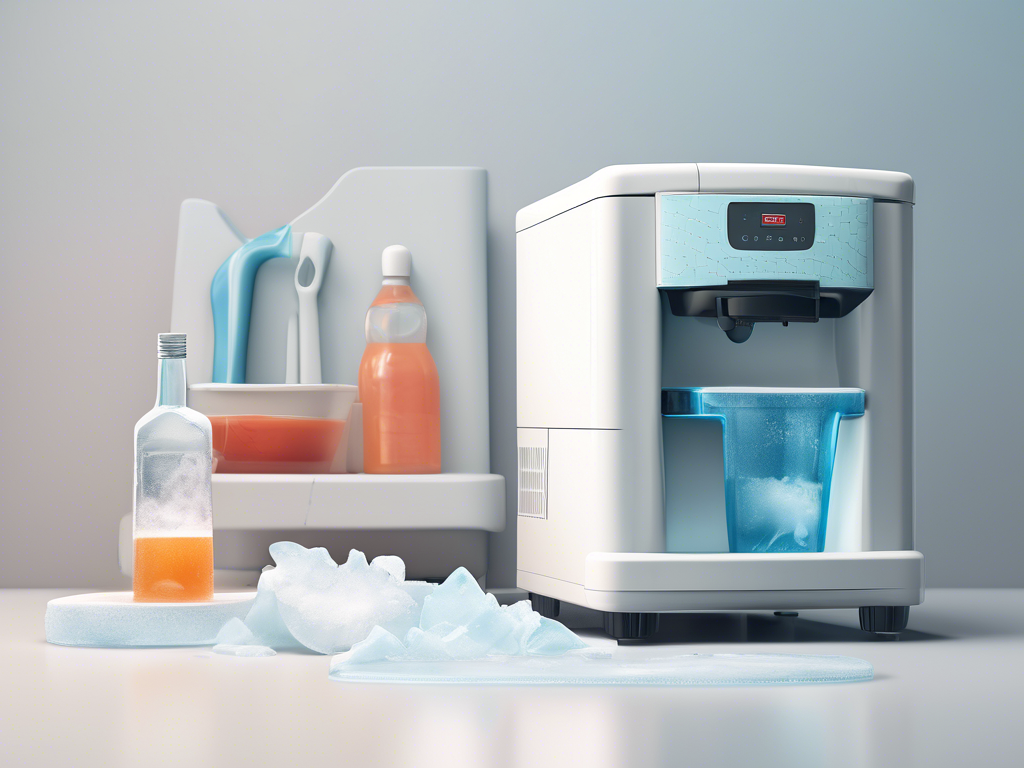
Preparation for Cleaning
Before you start the deep cleaning process, it’s essential to prepare adequately. Begin by unplugging your ice maker and emptying any remaining ice. This ensures safety while cleaning and allows you to address all areas without obstruction. Gather your cleaning supplies, especially those that meet **cleaner certificate** standards. Having everything ready will streamline the cleaning process and prevent you from having to leave mid-clean to find an item. 🔌
Descaling the Ice Maker
To effectively remove limescale and mineral deposits, you’ll need to use a descaling solution. Follow the instructions on the product label for how to mix it correctly. Pour the solution into the water reservoir and let it sit for the recommended time to break down tough build-ups. After this, run a complete ice cycle to allow the solution to circulate through the system. Finally, drain and rinse the reservoir thoroughly to ensure no residue remains, meeting **cleaner certificate** guidelines. 💧
Cleaning Internal Components
With your ice maker emptied and descaled, it’s time to clean internal components. Use a soft cloth or sponge along with a **cleaner certificate** approved cleaning solution to wipe down surfaces. Pay special attention to the ice bin, evaporator plate, and any other accessible parts. For hard-to-reach areas, utilize cleaning brushes with soft bristles. Be thorough yet gentle, ensuring you do not damage sensitive components while achieving maximum cleanliness. 🧽
Sanitizing the Ice Maker
After cleaning, it’s crucial to sanitize your ice maker to eliminate any remaining bacteria or germs. You can use a mixture of one tablespoon of unscented bleach to one gallon of water. Wipe all surfaces inside the ice maker with this solution, paying special attention to areas that come into contact with water or ice. Allow the surfaces to air dry fully before reassembling your ice maker, ensuring compliance with **cleaner certificate** safety standards. ⚗️
Reassembly and Testing
Once everything is cleaned and sanitized, carefully reassemble any components that were removed during cleaning. Plug the ice maker back in and fill the reservoir with fresh water. Run a few ice cycles and discard the first batch of ice produced, as this will be tainted with any remaining cleaning solutions. This step ensures that your ice is safe for consumption and meets health regulations associated with the **cleaner certificate**. ❄️
Regular Maintenance Schedule
To keep your ice maker in peak condition, establish a regular cleaning schedule. Depending on usage, aim for a deep clean every 1-3 months. Keeping track of your maintenance activities helps ensure compliance with **cleaner certificate** requirements and promotes better ice quality over time. Remember, consistent upkeep prevents bigger problems down the line, saving you money and providing fresher ice consistently. 📅
Understanding the Importance of a Cleaner Certificate for Your Appliances
The Role of a Cleaner Certificate in Appliance Maintenance
Obtaining a cleaner certificate is essential for those responsible for maintaining appliances, especially in commercial settings. This certification signifies that proper cleaning and sanitation measures are in place, which is crucial for ensuring the safety of food and beverages served to customers. Compliance with these standards not only protects consumer health but also enhances the reputation of your business. Being certified reassures customers that you prioritize cleanliness and safety above all. 🏅
Health and Safety Compliance
A cleaner certificate is often a requirement in industries where hygiene is paramount, such as restaurants or catering services. Regular evaluations and cleanings help ensure that your appliances, including ice makers, do not become breeding grounds for harmful bacteria and contaminants. By adhering to these regulations, you minimize risks associated with foodborne illnesses, thus protecting both your customers and your business from potential legal issues. 🚨
Enhancing Customer Trust and Satisfaction
When businesses hold a cleaner certificate, they demonstrate their commitment to high cleaning standards. This transparency fosters trust among consumers, making them more likely to choose your services repeatedly. Customers are more inclined to patronize establishments that visibly prioritize cleanliness, resulting in increased customer satisfaction and loyalty. Ultimately, this can lead to better reviews and word-of-mouth referrals! 🌟
Cost-effective Operations
Maintaining a cleaner certificate can result in significant cost savings over time. By keeping appliances clean and well-maintained, you reduce the likelihood of costly repairs and replacements. Furthermore, efficient machines consume less energy, leading to lower utility bills. Investing in regular maintenance and compliance with cleaning standards proves to be economically beneficial, allowing for better budgeting within your operation. 💰
Training Staff on Cleaning Protocols
Achieving and maintaining a cleaner certificate requires proper training for staff on cleaning protocols and procedures. Educated employees are empowered to uphold cleanliness standards consistently. Training ensures that everyone understands the importance of maintaining appliances like ice makers and reduces the likelihood of lapses in cleaning routines. A well-informed team contributes significantly to overall operational efficiency and compliance. 📚
Conclusion: The Long-term Benefits of a Cleaner Certificate
In summary, prioritizing a cleaner certificate for your appliances, particularly ice makers, is vital for various reasons. Not only does it bolster health and safety compliance, but it also enhances customer trust, promotes cost-effective operations, and unifies staff training efforts. By maintaining strict cleanliness standards and obtaining the necessary certifications, businesses can thrive while ensuring a safe environment for everyone involved. 🌈
Common Mistakes to Avoid When Cleaning Your Ice Maker
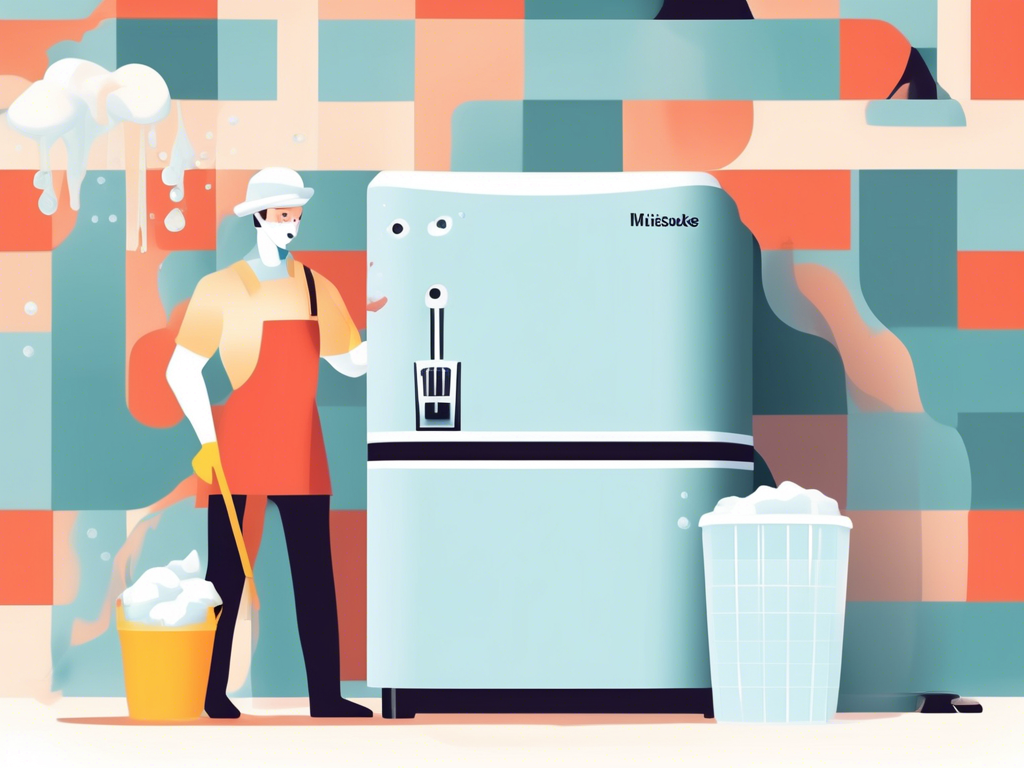
Overlooking Regular Maintenance
One of the most common mistakes is neglecting to establish a regular cleaning schedule. Failing to clean your ice maker frequently can lead to the buildup of dirt and minerals, which affects both the taste of your ice and the efficiency of the machine. It’s essential to stick to a routine, ideally every 1-3 months, to ensure your ice maker operates at its best while meeting cleaner certificate requirements. 📅
Using Harsh Chemicals
Many people make the error of using harsh chemicals that can damage their ice maker components. Instead, opt for cleaner certificate approved solutions specifically designed for appliance cleaning. These products are safe for internal parts and effective in removing grime without causing harm. Always check labels and avoid bleach or abrasive cleaners unless explicitly recommended by the manufacturer. 🧴
Ignoring Manufacturer Instructions
Not following the manufacturer’s cleaning instructions is another frequent misstep. Each ice maker has unique components and cleaning needs, and failing to adhere to these specific guidelines can void warranties or lead to damage. Consult your user manual for proper procedures and utilize cleaner certificate compliant practices for optimal results. 📖
Neglecting the Water Source
Many users forget that the quality of water used impacts the cleanliness and flavor of ice produced. Using tap water without filtration may introduce impurities that can accumulate over time. Consider investing in a water filtration system or regularly changing water sources to ensure compliance with cleaner certificate standards and provide fresher, cleaner ice. 💧
Skipping the Sanitizing Step
After cleaning, skipping the sanitizing step is a mistake that can lead to bacteria growth. It’s crucial to sanitize your ice maker to eliminate any remaining germs and ensure safe ice production. A mixture of unscented bleach and water is effective, but always let surfaces dry completely post-sanitization to prevent contamination. Adhering to this practice supports your efforts to meet cleaner certificate regulations. ⚗️
Not Training Staff on Proper Procedures
In commercial settings, lack of staff training on cleaning procedures can hinder compliance with cleaner certificate standards. Ensure your team understands the importance of proper cleaning techniques and protocols. Regular workshops can empower your employees to maintain cleanliness consistently, safeguarding both your machine’s performance and your business’s reputation. 📚
Eco-Friendly Cleaning Solutions for Your Ice Maker
Natural Ingredients for Effective Cleaning
Utilizing natural ingredients is a great way to keep your ice maker clean without harmful chemicals. Simple household items like **vinegar** and **baking soda** can effectively remove stains, scale, and odors. To use vinegar, mix equal parts with water and wipe surfaces down, then rinse thoroughly. Baking soda can be sprinkled on damp surfaces to help scrub away tough grime. Not only are these solutions environmentally friendly, but they also align with obtaining a cleaner certificate since they reduce chemical exposure. 🍃
Benefits of Eco-Friendly Cleaning Solutions
Choosing eco-friendly cleaning solutions for your ice maker offers numerous advantages. First, these methods avoid harsh chemicals that can linger in the ice produced, maintaining a safer environment for consumers. Second, eco-friendly cleaners often provide effective sanitization without contributing to environmental pollution. This practice can bolster your compliance with cleaner certificate standards, showcasing your commitment to health and safety in a sustainable manner. 🌍
Using Essential Oils for Freshness
Essential oils not only add a pleasant fragrance but also possess antibacterial properties. Oils like **tea tree** or **lavender** can be mixed into your eco-friendly cleaning solutions to enhance their disinfecting capabilities. Simply add a few drops to your vinegar or baking soda mixture before cleaning. Keep in mind that a little goes a long way, and it’s essential to dilute them properly to ensure they’re safe for your appliance while supporting your goals of achieving a cleaner certificate. 🌱
Creating Your Own Cleaning Solution
Making your own eco-friendly cleaning solution is easy and ensures you know exactly what’s going into it. Combine one cup of **vinegar** with two cups of water in a spray bottle for a powerful cleaner. For extra scrubbing power, you can add a tablespoon of **baking soda** to the mixture. Spray onto surfaces inside the ice maker, let it sit for several minutes, then wipe clean. This DIY solution meets most guidelines for a cleaner certificate, making it an ideal choice for regular maintenance! 🧴
Regular Maintenance with Eco-Friendly Practices
Establishing a cleaning routine using eco-friendly products will not only help keep your ice maker running smoothly, but it will also contribute to meeting necessary cleanliness standards. Schedule regular cleanings every 1-3 months using the homemade solutions and tools mentioned above. By adopting these sustainable practices, you’ll enhance both the efficiency of your ice machine and your likelihood of obtaining a cleaner certificate. Remember, consistency is key! 📅
How Often Should You Clean Your Ice Maker? A Scheduling Guide

Creating a Cleaning Schedule
Establishing a cleaning schedule for your ice maker is vital to maintaining its performance and ensuring compliance with cleaner certificate standards. Aim for a thorough deep clean every 1-3 months, depending on how often you use the machine. If it’s in a commercial setting, consider cleaning it monthly to keep up with health regulations. Remember, consistency in cleaning promotes better ice quality and a longer lifespan for your appliance. 📅
Signs Your Ice Maker Needs Immediate Cleaning
While having a scheduled cleaning routine is essential, knowing when to clean in-between is equally important. Watch out for these signs that indicate your ice maker needs immediate attention:
- Cloudy or discolored ice: This can be a sign of impurities in the water supply or contaminants in the machine.
- Unpleasant odors: A foul smell may suggest mold or bacteria buildup.
- Slow ice production: If your ice maker is producing ice slower than usual, it might be time for a clean.
Reacting quickly to these signals will help maintain your compliance with cleaner certificate requirements and ensure safe, high-quality ice production. 🚨
Seasonal Deep Cleans
Consider scheduling seasonal deep cleans for your ice maker, especially before peak usage times like summer or holiday parties. By timing your cleanings around periods of high demand, you can ensure optimal ice production. For example, performing a thorough cleaning in early spring can prepare your ice maker for the busy summer season. This proactive approach not only meets cleaner certificate expectations but also enhances customer satisfaction during peak times. ☀️
Post-Events Maintenance
After hosting events or gatherings, don’t forget to give your ice maker some extra care! The increased use of your ice maker means more potential for dirt accumulation and might require cleaning sooner than your regular schedule. Make it a habit to inspect and clean the ice maker after large events, keeping it compliant with cleaner certificate standards while ensuring you provide your guests with fresh ice. 🎉
Keeping Track of Your Cleaning Routine
Maintaining an organized record of your cleaning activities can simplify your maintenance schedule. Consider using a calendar or a cleaning log where you note the dates of past cleanings and any observations such as performance issues. This practice not only helps you stay on track but also aligns with the requirements of the cleaner certificate, reinforcing your commitment to hygiene and appliance efficiency. 🗓️
The Benefits of Having a Cleaner Certificate for Your Home Appliances
Understanding the Importance of a Cleaner Certificate
Having a cleaner certificate is crucial for ensuring that your home appliances are maintained to high hygiene standards. This certification demonstrates that you prioritize cleanliness and safety, particularly for appliances like ice makers, which directly impact the quality of food and beverages. Whether for personal use or commercial settings, a cleaner certificate ensures compliance with health regulations, safeguarding your family’s or customers’ well-being. 🌟
Boosting Appliance Efficiency and Longevity
A cleaner certificate reflects that regular maintenance has been implemented, helping your appliances operate more efficiently. This includes your ice maker, which will produce better quality ice and use less energy when kept clean. Regular upkeep not only enhances performance but also extends the lifespan of your appliances, saving you money on replacements and repairs over time. By keeping your appliances certified, you’re investing in their longevity! 💪
Enhancing Property Value
For homeowners, demonstrating that appliances have a cleaner certificate can enhance property value. Prospective buyers are often attracted to homes with well-maintained appliances, as this signifies lower upkeep costs in the future. A valid certification serves as evidence that your appliances have been regularly cleaned and serviced, making your home more appealing in the real estate market. 🏡
Improving Health and Safety Standards
A cleaner certificate emphasizes the importance of health and safety standards. It signifies that your appliances do not harbor harmful bacteria or contaminants, minimizing the risk of foodborne illnesses. In commercial settings, compliance is vital not only for legal reasons but also to cultivate customer trust. Maintaining high sanitation standards through certification reassures customers that you prioritize their health. 🚨
Encouraging Responsible Usage and Maintenance Practices
Achieving a cleaner certificate fosters responsible usage and maintenance habits among users. When individuals understand the importance of maintaining cleanliness, they are more likely to adhere to established cleaning schedules and protocols. This collective commitment results in better-functioning appliances and a more hygienic environment overall. Regular training and reminders can help keep it top-of-mind for everyone involved. 📚
Conclusion: The Long-term Advantages of a Cleaner Certificate
In summary, obtaining a cleaner certificate for your home appliances offers a multitude of benefits ranging from enhanced appliance efficiency to improved health and safety standards. By prioritizing regular cleaning and maintenance, you not only protect your investment but also create a safer and more pleasant living or working space. Don’t underestimate the power of a cleaner certificate—it’s a crucial step towards smart appliance ownership! 🌈
Troubleshooting Your Ice Maker: Signs It Needs a Professional Clean
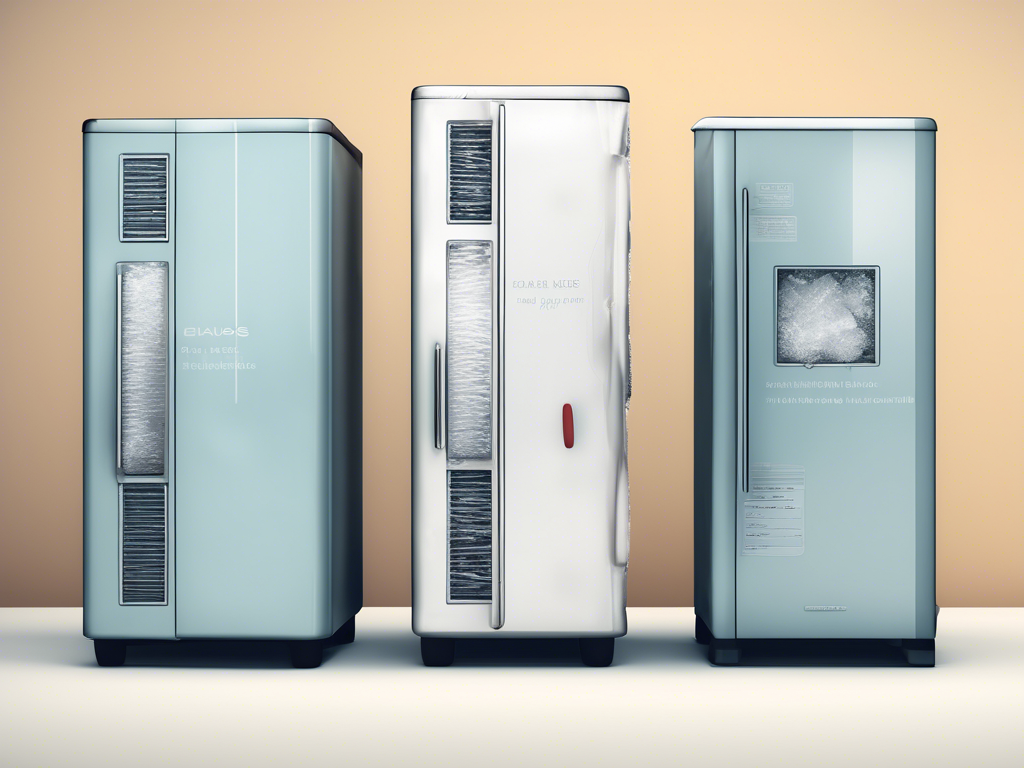
Unusual Ice Quality
If you notice that your ice has become cloudy, discolored, or has an off-putting odor, it may indicate that your ice maker requires professional attention. Poor-quality ice often stems from mineral build-up or contamination within the machine. Such issues not only affect the aesthetic and taste of your ice but can also lead to compliance problems, especially if you’re operating in a commercial setting where a cleaner certificate is crucial. 🧊
Decreased Ice Production
Another sign that your ice maker might need cleaning is a reduction in ice production. If your appliance is struggling to keep up with demand or takes longer to produce ice, it could be a result of internal blockages or inadequate maintenance. Addressing these issues promptly is essential to ensure that your ice maker continues to operate efficiently and remains compliant with cleaner certificate regulations. ⏲️
Frequent Error Messages
Modern ice makers are equipped with error detection systems that alert users when something is wrong. Frequent error messages should not be ignored—especially those relating to cleaning or maintenance issues. These messages can serve as critical reminders that your ice maker needs professional care to restore it to optimal functioning, ensuring it adheres to the standards set by a cleaner certificate. ⚙️
Visible Mould or Bacteria Growth
The presence of visible mould or bacteria inside your ice maker is a serious concern and requires immediate professional cleaning. Such growth compromises not only the quality of your ice but also poses health risks. Regular maintenance checks should prevent this issue, but if it occurs, timely intervention is necessary to comply with health standards associated with a cleaner certificate and to protect your customers’ wellbeing. 🚨
Persistent Unpleasant Odors
Foul smells emanating from your ice maker can suggest contamination or the breakdown of components within the machine. If a simple cleaning doesn’t eliminate the odor, it’s time to call in a professional. Failure to address persistent odors can result in non-compliance with cleaner certificate guidelines and may undermine customer trust in your establishment. 🌫️
Contacting a Professional Cleaner
If you’ve noticed any of the signs mentioned above, contacting a professional cleaner is the next step. Professionals can thoroughly inspect, clean, and sanitize your ice maker, ensuring it meets the necessary hygiene standards for a cleaner certificate. Regular professional cleaning not only aids in maintaining ice quality but also prolongs the life of your equipment, making it a worthwhile investment. 📞
Summing up
In conclusion, caring for your ice maker is more than just a chore; it’s an investment in your home’s efficiency and hygiene. Throughout this guide, we’ve emphasized the importance of regular maintenance and provided practical steps to ensure your ice maker operates smoothly. From the tools you need for cleaning to avoiding common pitfalls, each element plays a significant role in preserving your appliance’s longevity.
Moreover, understanding the concept of a cleaner certificate not only protects your investment but also contributes to a healthier kitchen environment. By adhering to a consistent cleaning schedule and employing eco-friendly solutions, you’re taking proactive steps toward a better lifestyle and contributing to sustainability.
So, as you reflect on your kitchen habits, remember that a little effort goes a long way in enhancing the functionality of your ice maker. Don’t wait for problems to arise; act now! Set a reminder to clean your ice maker and enjoy the numerous benefits it brings—from improved ice quality to a cleaner kitchen environment. Together, let’s make sure our ice makers continue to serve us well, one clean cycle at a time!
